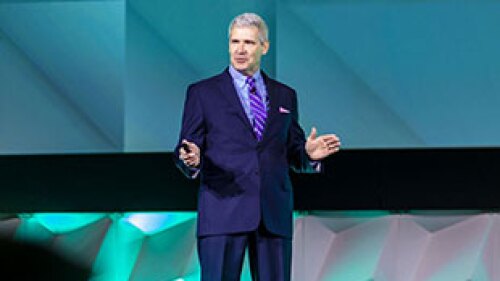A three-part series of interviews during the 2020 ULI Virtual Fall Meeting examined the issues that have led to underinvestment in neighborhoods that have been predominantly African American, displacement that can occur as part of gentrification, and other topics. The discussion—led by Michael Banner, a member of the ULI Americas Executive Committee and the president and chief executive officer of Los Angeles LDC, a community development financial institution—largely focused on Los Angeles, Nashville, and Washington, D.C., all of which have seen significant growth in the past decade.
In the first session, Banner interviewed Mayor James T. Butts, mayor of Inglewood, California, one of 88 independent cities in Los Angeles County. Inglewood just saw the opening of the $5 billion SoFi Stadium, home to the National Football League’s Chargers and Rams franchises.
A former police chief, Butts ran for office primarily on police reform as the city’s police department was about to be disbanded. Through furloughs and benefits cuts, Butts was able to keep the police department operating and avoid receivership. After being elected, Butts worked with the owners of the Los Angeles Forum, the Madison Square Garden Company, to reopen the venue. “By the time 2014 ended, the Forum was the number-one concert venue in the state of California, number two in the country, and number three in the world for booked events,” he said.
“Most people don’t know that from 1922 to 1937, Inglewood was the center for the Ku Klux Klan. It was an all-white community,” Butts said. Racial covenants kept African Americans out of the community until the 1960s. When Butts joined the police department in 1972, gentrification was taking place, with white families moving out in large numbers.
The National Basketball Association and National Hockey League franchises left the Los Angeles Forum in 1999 to go to the new Staples Center, and the city had seen its economic situation change significantly and its crime rate rise. But that has shifted with Los Angeles scheduled to host the 2028 Summer Olympics and qualifying as a finalist for the 2026 FIFA World Cup, and Inglewood slated as a site of many of the events. Banner said he moved his office to Inglewood because a lot of investment taking place there over the next decade.
When he was first elected in 2011, businesses did not want to be associated with the brand of Inglewood, but they are starting to again. Inglewood lost one of its two hospitals at one point, raising the issue of access to health care in the community.
When Butts took office, the unemployment rate was 17.5 percent, one of the highest in the country, but had fallen to 4.7 percent, pre-pandemic. “Every one of our community development agreements has a 30 percent local-hire goal; that’s verified by Certified Payrolls,” he said. “As a result, when the Forum was redone, there were 600 construction jobs, and then 150 people worked there pre-pandemic. There were 10,000 jobs of various duration to build SoFi Stadium.”
Butts said median home prices are up and crime has declined for nine straight years, but that could change if the Forum cannot be reopened for live events and other employment centers remain closed or at reduced capacity.
In the second session, Banner spoke with Donahue “Don” Peebles III, chief executive officer of the Peebles Corporation, which practices what it calls “affirmative development” and is involved in a billion-dollar project in downtown Los Angeles, and Buwa Binitie, managing principal of Dantes Partners, which has closed nearly $1 billion in unconventional real estate transactions primarily for preserving 3,000 units of affordable housing.
Born and raised in Lagos, Nigeria, Binitie said his father was a serial entrepreneur with real estate only part of his Lagos portfolio. Binitie said he would go to the job sites and learn about construction and other parts of the process. When he moved to San Francisco, he was struck by the difficulty of finding an affordable place to live, even for those with a good paying job. “I said to myself, I have to be part of the solution and not the problem, so when the opportunity presented itself in the District of Columbia [initially in the public sector],” Binitie said, he took it. “That was when I said real estate is something that I wanted to get myself into, and I’ve been doing it ever since.”
Peebles said he takes pride in Binitie’s success; they met him when Binitie was with the Washington, D.C., Mayor’s Office in economic development and contemplating going into the private sector. “I take a great deal of pride—and a big part of what I get out of doing business today as becoming an elder statesman at 60—is to see the next generation of entrepreneurs who are creative, and be able to make their marks and knock down barriers that confront people of color,” Peebles said. “While there are opportunities, there are also significant barriers.” Peebles said his own grandparents moved to Washington looking for a better life fleeing segregation.
Peebles said having been born in Washington in 1960, he was the perfect age to begin working in the city in the early 1980s as an entrepreneur after the disinvestment and riots of the 1960s. His mother became a real estate broker, which inspired him to start doing appraisals. At age 26, Peebles built a preleased $10 million office building—with help from then Mayor Marion Barry Jr.—when he did not even own his own home. His company still owns that building today and is upgrading it.
Banner said his own sister graduated at the top of her class in the Watts neighborhood of Los Angeles and aspired to be an architect, but settled into a career in education instead because it was what was accessible and familiar to her.
Said Binitie, “I approach each deal as if I have no money, as if I don’t have access to the capital that others may. We have to get creative with our financing, with our design consultants.” Many varied resources are available to him in Washington, he said, including two Black-owned banks that might be willing to do a less traditional loan or have a better understanding of the market. One example Binitie cited was helping a tenant association buy out a building about 15 years ago. He said he still works with the same lender.
Banner said in his own experience as a lender, in economically challenged communities banks did not want to lend to more than 65 percent loan to value because it was perceived as too risky. Peebles said part of his company’s philosophy is that it only does large-scale projects with significant barriers to entry, citing the $1.6 billion Angels Landing project in Los Angeles. “Our deal size today for new deals is going to be in that $500 million-or-higher space.”
Peebles cited the Black empowerment era of the 1980s in U.S. cities, which led to Robert “Bob” L. Johnson creating the Black Entertainment Television cable channel and media companies and becoming a billionaire. Peebles is spending more than half his time helping raise institutional capital for people like Binitie who have projects and a good track record and want to invest in smaller projects at a good return.
In the third session, Banner spoke with Edward Henley III, principal and project executive with Pillars Development. He has been chair of mission advancement for ULI Nashville and is the incoming chair of that district council, which hosted the ULI Spring Meeting in 2019.
Henley said he grew up playing Monopoly and developed a strategy that allowed him to win consistently. “When I grew up, my dad was a renter, so I was able to understand what it was like to have a landlord, interact with a landlord, see the dynamic between a renter and a landlord,” he said. Henley said his landlord invited him to visit a ranch property outside the city, which helped open his eyes at a young age to the possibilities of ownership, development, and wealth.
Banner said his parents owned the home in the Watts neighborhood where he grew up, but when the city offered them $20,000 for their home as part of a redevelopment, they sold. They used half the money to buy a house in Compton, which eventually came to be worth hundreds of thousands of dollars and paved the way to his middle-class upbringing.
Henley said his first real estate deal was a “house hack”: he bought a house with a friend who helped him pay the mortgage, then used the cash flow and appreciation to buy several lots before the start of Nashville’s current boom cycle. In 2014 at age 24, he bought a duplex with an associate, putting $20,000 into it and renting it out, he said.
Henley said growing up in Nashville, he has benefited from its emergence as an “it” city over the past decade, which helped him aspire to do bigger deals. He also worked as part of a public/private partnership on the $2 billion convention center expansion, which drives significant business travel and tourism dollars to the city.
“There were some very powerful individuals in Nashville who understood that our city was about to boom, that we were doing something special,” he said. “The timing was right to make a case for participation for minorities in all facets of our public government, but particularly in capital projects and capital spending. I myself am the product of a workforce development initiative.” Henley said both the individuals in and the policies of the city gave him confidence to start a firm and expect success, but also to focus on the community where he grew up and not relocate.
Banner recounted listening to Detroit Mayor Mike Duggan say at a ULI event that when American cities are booming, it is important to not forget about the long-term residents who have been there through the bad times and the good.
Henley said, “Community engagement is something that I’m very passionate about. Community engagement in its traditional sense is not enough. We need to transition that term into community education and community empowerment. . . . Making people feel heard is important. It is imperative that we take on the task of education in all senses, but particularly in land use and development.”
ULI members can search for more of programming focused on diversity, equity, and inclusion on Knowledge Finder. You can also check with your local ULI district council for events in your area.








